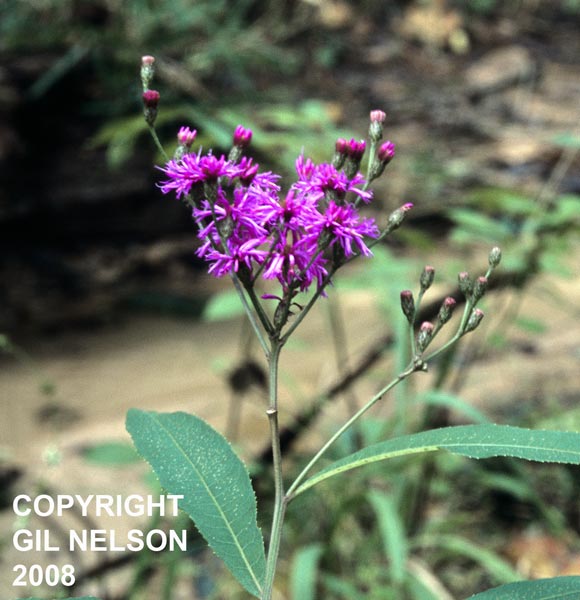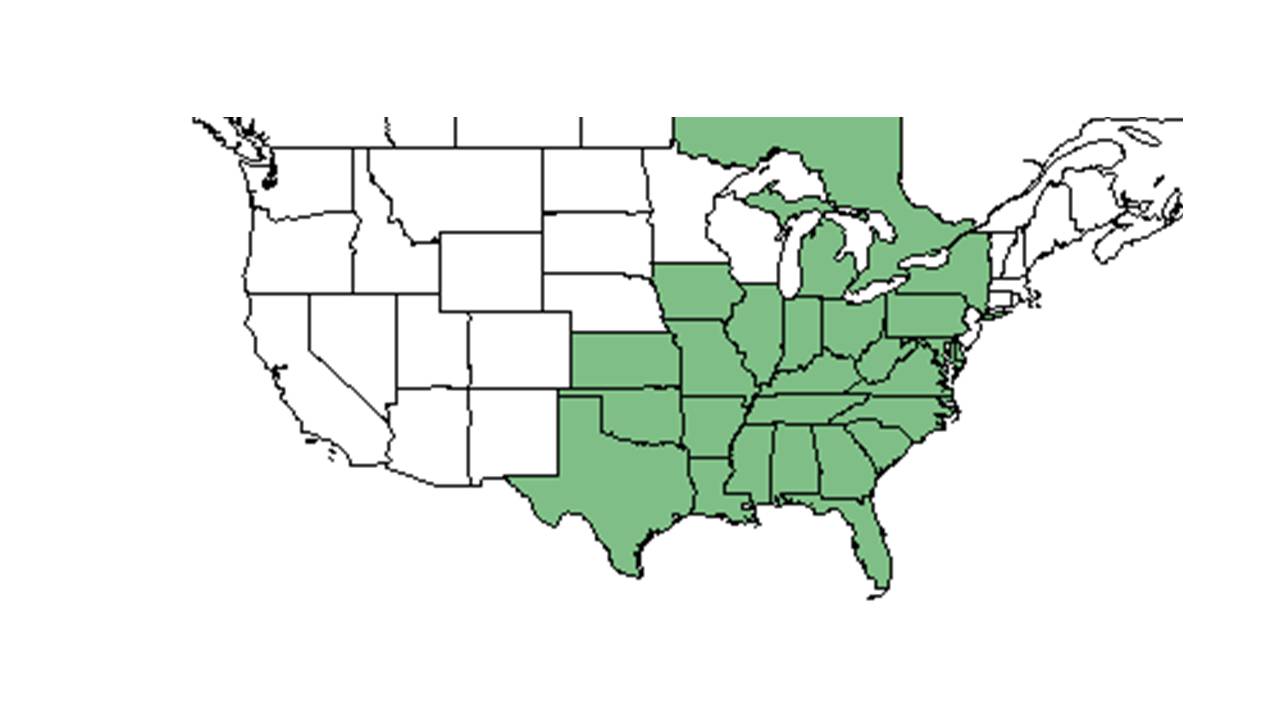Difference between revisions of "Vernonia gigantea"
(→Photo Gallery) |
|||
| Line 20: | Line 20: | ||
Common name: giant ironweed | Common name: giant ironweed | ||
==Taxonomic notes== | ==Taxonomic notes== | ||
| + | Synonyms: ''Vernonia gigantea'' var. ''gigantea''; ''Vernonia gigantea'' (Walter) Trelease ssp. ''gigantea''; ''Vernonia altissima'' Nuttall; ''Vernonia altissima'' var. ''taeniotricha'' S.F. Blake | ||
==Description== | ==Description== | ||
<!-- Basic life history facts such as annual/perrenial, monoecious/dioecious, root morphology, seed type, etc. --> | <!-- Basic life history facts such as annual/perrenial, monoecious/dioecious, root morphology, seed type, etc. --> | ||
| Line 34: | Line 35: | ||
It has been observed flowering January through November and fruiting June through November (FSU Herbarium). | It has been observed flowering January through November and fruiting June through November (FSU Herbarium). | ||
| − | ===Seed dispersal=== | + | <!--===Seed dispersal===--> |
===Seed bank and germination=== | ===Seed bank and germination=== | ||
Heating at low temperatures stimulates germination in ''V. gigantea'' (Emery et al. 2011). | Heating at low temperatures stimulates germination in ''V. gigantea'' (Emery et al. 2011). | ||
| Line 40: | Line 41: | ||
===Fire ecology=== <!--Fire tolerance, fire dependence, adaptive fire responses--> | ===Fire ecology=== <!--Fire tolerance, fire dependence, adaptive fire responses--> | ||
It has been observed to thrive after low-intensity fires (Emery et al. 2011). | It has been observed to thrive after low-intensity fires (Emery et al. 2011). | ||
| − | + | <!--===Pollination===--> | |
| − | ===Pollination=== | + | <!--===Use by animals===--> <!--Herbivory, granivory, insect hosting, etc.--> |
| − | ===Use by animals=== <!--Herbivory, granivory, insect hosting, etc.--> | + | <!--===Diseases and parasites===--> |
| − | ===Diseases and parasites=== | ||
==Conservation and Management== | ==Conservation and Management== | ||
==Cultivation and restoration== | ==Cultivation and restoration== | ||
Revision as of 18:12, 7 June 2016
| Vernonia gigantea | |
|---|---|

| |
| Photo taken by Gil Nelson | |
| Scientific classification | |
| Kingdom: | Plantae |
| Division: | Magnoliophyta – Flowering plants |
| Class: | Magnoliopsida – Dicotyledons |
| Order: | Asterales |
| Family: | Asteraceae ⁄ Compositae |
| Genus: | Vernonia |
| Species: | V. gigantea |
| Binomial name | |
| Vernonia gigantea (Walter) Trel. | |

| |
| Natural range of Vernonia gigantea from USDA NRCS Plants Database. | |
Common name: giant ironweed
Contents
Taxonomic notes
Synonyms: Vernonia gigantea var. gigantea; Vernonia gigantea (Walter) Trelease ssp. gigantea; Vernonia altissima Nuttall; Vernonia altissima var. taeniotricha S.F. Blake
Description
A description of Vernonia gigantea is provided in The Flora of North America.
Distribution
Ecology
Habitat
In the Coastal Plain, V. gigantea has been found in loam soil atop of a ravine; loamy sand in mesic hardwoods; river hammocks; marshes; floodplain forests; upland mixed forest; shortleaf pine-post &red oak-mockernut woods; pine-oak-hickory woods in a ravine; annually burned upland pineland; calcareous slopes; sandy loam in mature hardwoods; sandy open live oak hammocks; sand beneath cabbage palm thicket; calcareous mixed flatwoods hammocks; hammock surrounded by marsh; lowland forests habitats; and sandy peat in a clearing of cabbage palm-live oak hammock (Emery et al. 2011; FSU Herbarium). It is found in disturbed successional areas (Emery et al. 2011) along with moist loam of roadside depressions; loamy sand along edge of channel; open mixed hardwood forest between power-line and road; along powerline corridors; and grassy clearings of pine-palmetto flats. Substrate types include loam, loamy sand, sandy loam, calcareous soils, limestone, sand, and sandy peat (FSU Herbarium).
Associated species include Eupatorium fisulosum, Arnoflossum ovatum, Smilax bona-nox, Morus rubra, Campsis radicans, and cabbage palm (FSU Herbarium).
Phenology
It has been observed flowering January through November and fruiting June through November (FSU Herbarium).
Seed bank and germination
Heating at low temperatures stimulates germination in V. gigantea (Emery et al. 2011).
Fire ecology
It has been observed to thrive after low-intensity fires (Emery et al. 2011).
Conservation and Management
Cultivation and restoration
Photo Gallery
References and notes
Emery, S. M., J. Uwimbabazi, et al. (2011). "Fire intensity effects on seed germination of native and invasive Eastern deciduous forest understory plants." Forest Ecology and Management 261: 1401-1408.
Florida State University Robert K. Godfrey Herbarium database. URL: http://herbarium.bio.fsu.edu. Last accessed: July 2015. Collectors: Loran C. Anderson, Robert K. Godfrey, Robert L. Lazor, Gary R. Knight, R. Kral, P. L. Redfearn, Jr., R. F. Thorne, R. A. Davidson, Brenda Herring, Don Herring, R. A. Norris, Andre F. Clewell, Sidney McDaniel, R. Komarek, Lisa Keppner, S. W. Leonard, Richard S. Mitchell, D. S. Correll, Grady W. Reinert. States and Counties: Florida: Brevard, Calhoun, Citrus, Dixie, Escambia, Flagler, Franklin, Gadsden, Gilchrist, Gulf, Jackson, Jefferson, Leon, Levy, Liberty, Madison, Nassau, Polk, Putnam, Seminole, St. Johns, Suwannee, Taylor, Wakulla, Washington. Georgia: Thomas. Mississippi: Holmes. Compiled by Tall Timbers Research Station and Land Conservancy.